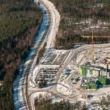To influence the debate, we must be part of the global nuclear energy discussion
By Stephen M. Goldberg, October 16, 2008
I just returned from the Middle East and it’s abundantly clear that U.S. influence in that part of the world is receding. The financial meltdown that’s going on is also contributing to an international lack of confidence in U.S. policies and is affecting our ability to influence day-to-day events around the world.
I have reflected upon my earlier contribution as well as the contribution of Miles Pomper, who writes in his most recent response that he doesn’t share Alan Hanson’s or my underlying assumption “that nuclear power is certain to undergo a rapid global expansion. Obviously, nuclear industry proponents would like this to be the case, but there are many impediments to nuclear energy’s growth.”
I think the economic forces are already in play in a variety of countries including India, Vietnam, and the United Arab Emirates, which will make deployment of nuclear energy essential so that economic-growth targets for these countries can be met. Therefore, Miles’s views may already be overtaken by events on the ground. In my opinion, the real key questions are: Will nuclear energy be deployed in a responsible manner by these countries and will the United States have any influence over their decisions?
Washington needs to be engaged bilaterally and multilaterally to have a positive impact on these nations’ technological development and choices. It’s still very uncertain how these countries will acquire their nuclear fuel and where and how their spent fuel will be disposed. Embedded in these questions are further questions, regarding choices of technologies and facilities that will be utilized. The United States and its major nuclear energy partners (i.e., Russia, Britain, France, and Japan) need to be at the forefront developing and implementing a robust nuclear fuel supply and disposal regime to limit the spread of new enrichment and reprocessing capabilities. This is the essence of the U.S. Global Nuclear Energy Partnership (GNEP). It’s clear to me that our global nonproliferation and nuclear safety priorities will be significantly at risk, if the United States is not at the table discussing with these countries our recommendations on how to implement advanced nuclear fuel cycle technologies.
Tom Cochran states that GNEP’s advanced reprocessing technologies are “essential but unlikely to reduce the repository requirements because fast reactors will not be deployed in large numbers,” and “would be even more costly than the conventional PUREX method, and produce even larger inventories of intermediate and low-level nuclear wastes.” Tom’s views prejudge the value of a vibrant advanced fuel cycle research and development program, including the discovery of new processes that would obviate Tom’s concerns. The challenges of how to handle the growing quantities of commercial spent fuel will be one of the key drivers shaping the GNEP program.
As a precondition to meaningful discussions with all of our international counterparts, we need to be engaged actively and productively in the research and development of these technologies. Otherwise, we will not be viewed as a credible player.
Topics: Nuclear Energy
Share: [addthis tool="addthis_inline_share_toolbox"]














